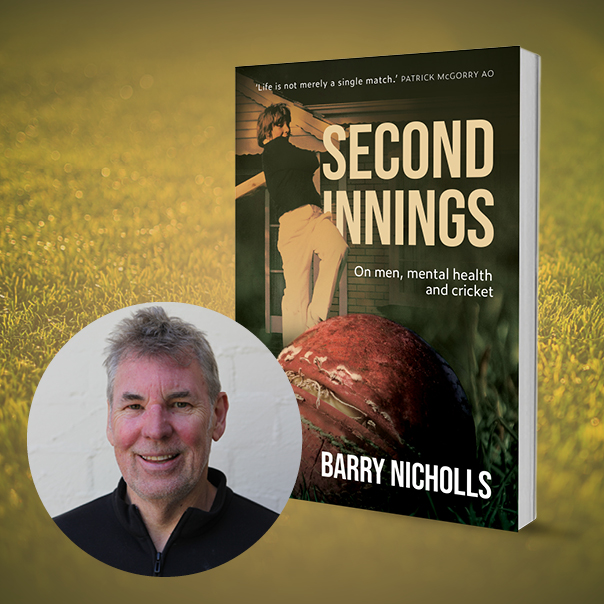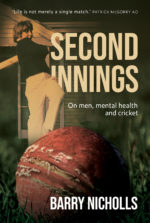Barry Nicholls bowls up with a new book and says sport is wonderful for mental health

In his new memoir Second Innings: On Men, Mental Health and Cricket Barry Nicholls says, ‘Life is like facing an opening bowler: the pitch is unknown, the ball is new and you don’t know what will be delivered.’ He describes the book as a story about his passion for cricket and how the friendships formed through sport can be crucial to dealing with whatever life throws at you – even if it is a curve ball of crippling anxiety.
Tell us about Second Innings
The book is set in alternating time frames. One is relatively recent times when I experienced some bad anxiety and later depression. The other is about growing up in the 1970s and beyond in a family where my parents’ troubled relationship and my older brother Steven’s severe mental illness made life pretty challenging at times.
Why do you think there is still a stigma attached to poor mental health?
I think that poor mental health is often incorrectly perceived as being a weakness of character rather than a medical issue. If we treated poor mental health as seriously as diseases like COVID-19 there might be a change in attitude. When it comes to stigma and mental health I think things are improving, but there is a long way to go particularly in relation to the more severe and chronic conditions. Part of the problem perhaps is that mental illness can be so hard to treat, so recovery may not happen with the same ease of some physical conditions.
You’ve written about some confronting events in your family when you were growing up and beyond. How difficult was this process?
It was very difficult to weigh up what to include and how best to frame it. Writing it was easy enough, but the final decision as to what to include and what to leave out had me sometimes waking in the middle of the night wondering if I’d made the right decision. I’ve tried to tell the story in the most balanced and honest way. I showed my eldest brother, Steven, what I’d written (some of the confronting stories involve his illness) and he thought this was the best book I’d written.
This book relates to family history. What advice do you have for anyone researching and writing their family’s story?
Gather the facts as you know them and tell the story in a way that is engaging. I always try and imagine the scene in my head and construct it more like a scene from a play rather than writing a chronological history. Identify themes in your family’s history and tell the story as a narrative. The best advice I received while writing Second Innings was to set the book in alternating time frames. Doing this provided a structure and context for telling the stories in the book.
Why is cricket such a focal point in your memoir?
Cricket was, in a way, the salve for me. Cricket is the constant in my life in one way or another. It became a reference point for how I related to particular life events. Identifying a cricket season or tour provided context or background for life in general. Cricket’s language was also helpful in having ‘difficult’ conversations with friends (e.g. if you were batting on a wet wicket, life was pretty tough).
Sport I think is wonderful for mental health. The joys of the physicality of playing and the sense of community and friendships gained are invaluable. I’m still close friends with blokes I played cricket with and against 40 years ago.
Any advice for aspiring writers about sport?
‘What do they know of cricket that only cricket know?’
So read extensively not just about sport but about all matter of subjects. Identify what makes some writing really appealing and evocative, and while developing your own voice follow their lead.
Barry Nicholls is a broadcaster, writer and former A-grade district cricketer who now enjoys spending his weekends watching his children embrace the challenges and pleasures of participating in sport. Second Innings: On Men, Mental Health and Cricket can be purchased in all good bookstores and online.



